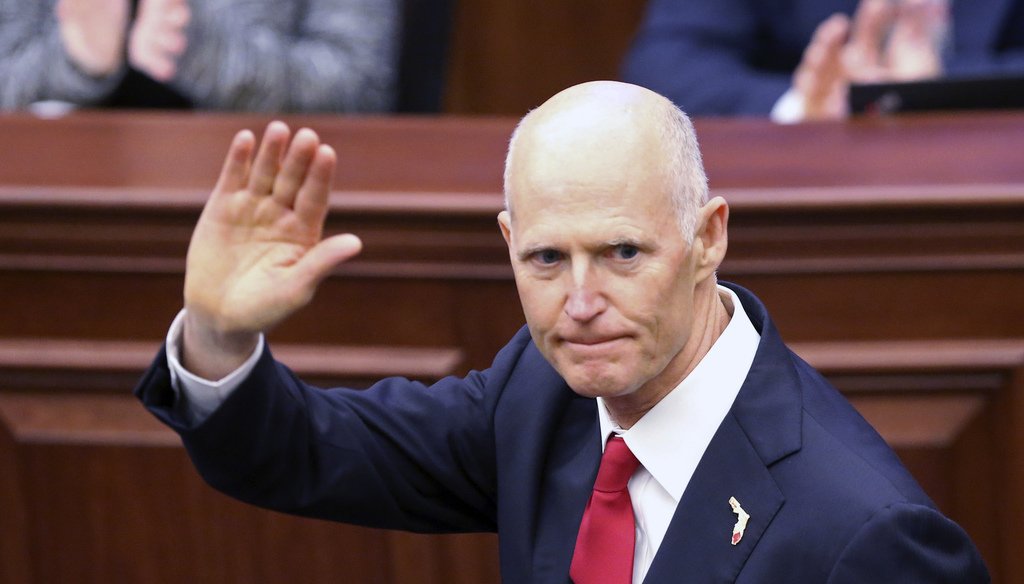Stand up for the facts!
Our only agenda is to publish the truth so you can be an informed participant in democracy.
We need your help.
I would like to contribute

Gov. Rick Scott waves as he is introduced to the Senate on the first day of legislative session, Tuesday, Jan. 9, 2018, in Tallahassee, Fla. (AP Photo/Steve Cannon)
In his final State of the State address, Gov. Rick Scott outlined how the state should help Puerto Ricans displaced by Hurricane Maria, and he encouraged lawmakers to make it easier for victims and witnesses of sexual harassment to come forward.
Of course, Scott also touted his efforts over the last seven years to bring more jobs to the state — even cracking a joke about his passion project.
"I know I talk about jobs numbers a lot, to the point where the reporters all roll their eyes," Scott said Jan. 9, 2018. "But there are some other statistics that are pretty impressive and show great strides in our state."
Scott repeated some of his favorite statistics about the economy since 2011. Democratic leaders responded by attacking Republican legislators for their actions on education in 2017.
Here’s a rundown of the governor’s remarks with context, as well as the Democratic response.
Jobs have always been important to Scott, who pledged to create 700,000 jobs (on top of the 1 million jobs the state would have created anyway) in seven years.
According to the Bureau of Labor Statistics, Florida added 1.48 million nonfarm jobs between the end of December 2010 and November 2017, the last month for which there is data.
With less than a year to go, that promise remains In the Works.
Scott’s statistic is accurate, but he neglected to mention some important context.
According to the BLS, the unemployment rate dropped from 10.7 percent in December 2010 to 3.6 percent in November 2017. This is the lowest rate Florida has seen since January 2007, before the decline of the housing market and economic recession disrupted the state’s economy for years.
Scott took office not long after the severe recession bottomed out. Whoever was elected governor in 2010 would have benefitted from some degree of job growth, since the worst of the recession would be behind them, and the economy tends to run in cycles.
The figures we found suggest Scott cherry-picked a high-end measurement favorable to his talking point.The most broad measure of the economy is the gross domestic product, or the total value of goods and services Florida produces.
The U.S. Bureau of Economic Analysis measures this two ways: nominal GDP (meaning, the measure in an actual dollar figure) and real GDP (the adjusted number for inflation and price increases). Scott’s spokeswoman Kerri Wyland said the 26-percent figure was in reference to the nominal GDP growth from 2010 to 2016.
From 2010 to 2016, Florida's nominal GDP grew from $735.1 billion to $926.1 billion, according to the Bureau of Economic Analysis. That's an increase of 26 percent, just like Scott said. However, the growth was less than half as much in terms of real GDP from $728 billion in 2010 to $835.1 billion in the second quarter of 2017, or a percent change of 14.7 percent.
According to a December 2017 report on Florida's debt affordability, as of June 30, 2017, the state's total overall debt outstanding stood at $22.7 billion. That’s a decrease of $5.5 billion since December 2010. So where did the other $4 billion come from?
Scott spokeswoman Kerri Wyland said the $9 billion-figure also includes $3.5 billion repayment of unemployment compensation fund loan taken out in 2009.
For the second straight year, House Democratic Leader Janet Cruz criticized Republican efforts to expand state support for education outside of traditional public schools.
"As Florida’s teachers continue to make $9,000 less than the national average in pay, Republicans in Tallahassee continue to expand a failed and discriminatory bonus program that does nothing to help attract and retain the most talented educators for our children," Cruz said.
On the specifics, teacher pay in Florida lags behind the national average by about $9,000, according to 2017 estimates by the National Education Association.
Did you hear something in need of a fact-check? Contact Allison Graves at [email protected].
Our Sources
Email interview, Lauren Schenone, press secretary for the Office of Governor Rick Scott, Jan. 9
Email exchange, Celeste Fernandez Busser, senior media strategist at National Educational Association, Jan. 9
Email exchange, Florida Department of Opportunity, Jan. 9
PolitiFact Florida, Florida teacher pay lags national average, just not quite by $10,000, March 17, 2017
PolitiFact Florida: Scott-O-Meter, Create over 700,000 jobs, accessed Jan. 9
PolitiFact Florida, Gov. Rick Scott says state debt is $23 billion," June 13, 2011
National Educational Association, Ranking of the States 2016 and Estimates of School Statistics 2017, May 2017 (accessed Jan. 9)
Bureau of Economic Analysis, Regional Economic Accounts, accessed Jan, 9, 2017
State of Florida 2010 Debt Affordability report, Florida Division of Bond Finance, December 2017












































